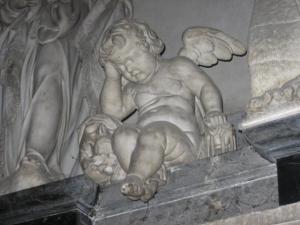“Weep for lost memories that never were. Weep for that which never was. Mourn the memories you do not possess. Mourn the present moment that was not willed to be.” I wrote these words in 2010 while sitting on the back pew of Saint Joseph Catholic Church in Washington, Georgia. The last time I had entered that small, rural parish was late December, 1995, a few days before my brother was diagnosed with cancer. I was scheduled to play the piano at Christmas Mass that year, we never made it.
“By the rivers of Babylon there we sat weeping when we remembered Zion. On the poplars in its midst we hung up our harps. For there our captors asked us for the words of a song; our tormentors for joy. Sing for us a song of Zion! But how could we sing a song of the Lord in a foreign land? If I forget you Jerusalem, may my right hand wither.” Taken from Psalm 137, these words were written by distraught Israelites while captive in Babylon after the destruction of Jerusalem in 586 BC. They had lost everything and now they lived in an unknown, distant land.
Lament is a powerful human emotion. If left unchecked, it can overwhelm those who have experienced great loss. The words of Psalm 137 have always resounded in my heart due to the profound longing they express. While in the seminary in Rome, I heard a priest state this Psalm encapsulated the experience of refugees, or anyone who has lost much (or everything), having to leave behind all that was familiar. Preaching at a Mass for immigrants, he invited us to hang up our harps by the Tiber and to join Israel’s lament.
As I sat alone at the parish in Washington where I had been confirmed, I realized we have to take the time to mourn those things that never came to fruition in our lives. We sometimes have reasonable expectations of the future that simply do not come about and we have to mourn these anticipated future moments which never became memories. They remained dreams and desires that never materialized due to elements beyond our control.
It is lamenting over an alternative life that never came to be. It is joining the Israelites weeping by the banks of the rivers of Babylon.
To remain here however is dangerous because no matter what, the past cannot be changed. We have to accept the twists and turns of life and embrace who we are today as the result of the many events and circumstances of our past. Anything else leads to insanity or despair. Living among ‘what ifs’ and ‘what would have beens’ is never helpful because it ravishes the heart preventing one from accepting ‘what is’ and ‘what has been.’ It is only by trusting in God’s Providence that we are able to sing a song of the Lord wherever we find ourselves, finding the meaning and purpose of our struggles, laments, and pains.
Picture is mine, all rights reserved. Weeping Angel of Amiens, 2008.
I wrote this article a few years ago, I’m reposting it.














